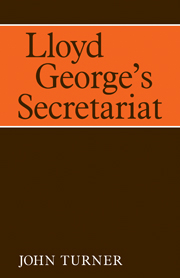Book contents
- Frontmatter
- Contents
- Acknowledgements
- Map of the Balkans, 1917
- 1 All in a garden fair
- 2 The new bureaucracy
- 3 Food and agriculture
- 4 Foreign affairs
- 5 Ireland
- 6 Imperial questions
- 7 The political culture of 10 Downing Street
- 8 Two malcontents
- 9 Conclusion
- Notes
- Bibliography
- Index
- Cambridge Studies in the History and Theory of Politics
- Frontmatter
- Contents
- Acknowledgements
- Map of the Balkans, 1917
- 1 All in a garden fair
- 2 The new bureaucracy
- 3 Food and agriculture
- 4 Foreign affairs
- 5 Ireland
- 6 Imperial questions
- 7 The political culture of 10 Downing Street
- 8 Two malcontents
- 9 Conclusion
- Notes
- Bibliography
- Index
- Cambridge Studies in the History and Theory of Politics
Summary
Ireland, though inconstant, is never dull!
Midleton to Adams, 1 March 1918.The Irish question, like many areas of policy examined in this book, was never far from crisis during the war. In 1914 Asquith had achieved a temporary settlement of the Ulster crisis by putting Home Rule on the Statute Book and suspending the Act for the duration of hostilities. Sir Edward Carson had acquiesced on behalf of Ulster, promising his followers that suspension meant that Home Rule would never be applied to the six counties. Ulstermen volunteered in large numbers, and their regiments were allowed to fight under the Red Hand of Ulster. No corresponding generosity was shown to the Irish Volunteers, whose services were declined when offered to the War Office by John Redmond, the leader of the Irish Nationalist Party. The Nationalists were discredited in Ireland by Redmond's acquiescence in the compromise over the Home Rule Act, and by his decision to accept a moratorium on the discussion of Irish constitutional matters for the duration of the war. The rising in Dublin at Easter 1916 was a direct consequence of Irish loss of confidence in parliamentary means of achieving a satisfactory political settlement. For all that, it was the work of a minority, and its historical importance as a representation of Irish political aspirations was established only by the Dublin Castle government, whose policy of executions, ‘a fresh batch every morning for breakfast’, made heroes of the rebel leaders and blackened the already tarnished name of English rule.
- Type
- Chapter
- Information
- Lloyd George's Secretariat , pp. 83 - 122Publisher: Cambridge University PressPrint publication year: 1980
- 2
- Cited by



